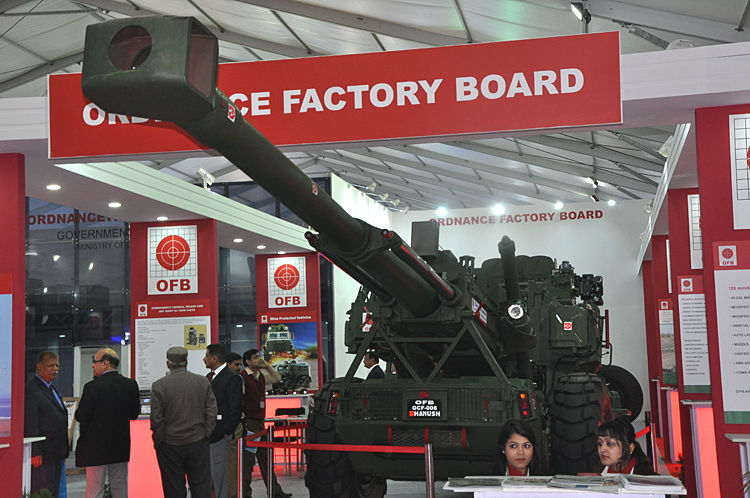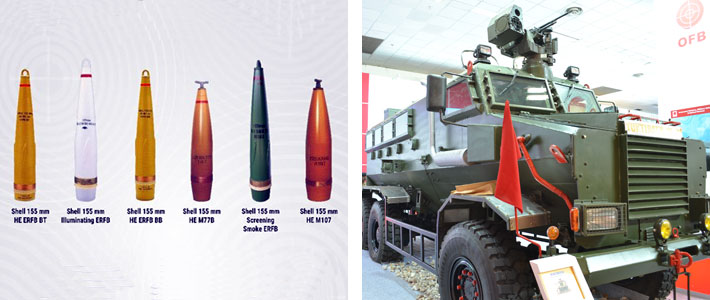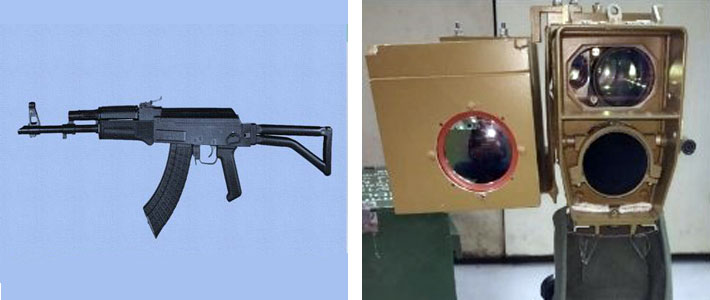INDIAN ARMED FORCES CHIEFS ON OUR RELENTLESS AND FOCUSED PUBLISHING EFFORTS

The insightful articles, inspiring narrations and analytical perspectives presented by the Editorial Team, establish an alluring connect with the reader. My compliments and best wishes to SP Guide Publications.

"Over the past 60 years, the growth of SP Guide Publications has mirrored the rising stature of Indian Navy. Its well-researched and informative magazines on Defence and Aerospace sector have served to shape an educated opinion of our military personnel, policy makers and the public alike. I wish SP's Publication team continued success, fair winds and following seas in all future endeavour!"

Since, its inception in 1964, SP Guide Publications has consistently demonstrated commitment to high-quality journalism in the aerospace and defence sectors, earning a well-deserved reputation as Asia's largest media house in this domain. I wish SP Guide Publications continued success in its pursuit of excellence.
- MoD initiates comprehensive review of Defence Acquisition Procedure 2020, pushes for defence reforms
- G7: The Swansong
- Kalinga Connect: South Asia to Polynesia
- Must Credit DRDO for Operation Sindoor, now what is next for defence R&D?
- The layered Air Defence systems that worked superbly, the key element of Operation Sindoor
- Operation Sindoor | Day 2 DGMOs Briefing
- Operation Sindoor: Resolute yet Restrained
Beyond the Decision to Corporatise OFB
Government has approved restructuring of the OFB and the 41 OFs into seven Defence Public Sector Undertakings (DPSUs) but their accountability, efficiency and competitiveness will improve only with privatisation
 |
The Author is Former Director General of Information Systems and A Special Forces Veteran, Indian Army |

Media reported on June 30, 2021, that three main recognised federations of defence civilian employees are serving a strike notice to the Union Government calling for an indefinite strike from July 26 in protest against the Cabinet's decision to split the Ordnance Factory Board (OFB) into seven fully government-owned corporate entities. Terming the Union Cabinet's decision "arbitrary, one sided and biased" that violated all the previous written agreements and assurances; they have demanded the immediate withdrawal of the government's corporatisation plan. Speaking to media AIDEF General Secretary C. Srikumar said that the federations and unions will serve notice for the strike on July 8, both independently and jointly.
The unanimous decision calling for an indefinite strike by the federations, which represent 76,000 employees across 41 Ordnance Factories (OF), will severely cripple the functioning of OFB factories across the country. A strike of this nature at a time when the India-China standoff in Ladakh is continuing beyond one year sacrilege and should be treated as treason especially when the government's corporatisation plan guarantees 100 per cent job security to all the 76,000 employees. The possibility of the leaders of these federations unions receiving money from China-Pakistan to disrupt defence production can hardly be ruled out. Nationalism in India is on sale anyway. Witness our Left Parties congratulating China's Communist Party (CCP) on its centenary and applauding Xi Jinping. After all they receive money and free trips to China.
Previous attempts to corporatise OFB were stonewalled due to strikes by workers unions for the fear of loss of jobs, protection of salaries, pensions and change in work culture
Government has approved restructuring of the OFB and the 41 OFs into seven Defence Public Sector Undertakings (DPSUs) as under:
- Ammunition & Explosives
- Vehicles
- Weapons & Equipment
- Troop Comfort Items (TCI)
- Ancillary
- Opto-Electronics
- Parachute Group


The Department of Defence Production (DoPD) under Ministry of Defence (MoD) has communicated that for the 'interim' - first set of Board of Directors of the Corporate entities is to be appointed from senior serving officials of OFB/DoPD, Armed Forces, CGDA and nine existing DPSUs; for CMD appointment, SAG and above level officers of Indian Ordnance Factory Services (IOFS), OFB, with minimum five years service in the SAG; for Functional Directors appointment, SAG officers of IOFS, OFB, with minimum two years service in the Grade, and; age – not more than 57 years on October 1, 2021.
Previous attempts to corporatise OFB were stonewalled due to strikes by workers unions: Indian National Defence Workers' Federation (INDWF) affiliated to Congress, All India Defence Employees' Federation (AIDEF) affiliated to the Left and Bhartiya Pratiraksha Mazdoor Sangh (BPMS) affiliated to RSS/BJP, all under the umbrella of Confederation of Defence Registered Associations. Their fear has been loss of jobs, protection of salaries, pensions and change in work culture from the current laid back to hard work under more efficient system.
The complete work force of OFB and all OFs are being subsumed into the seven new DPSUs under the corporatisation plan
As mentioned above, the complete work force of OFB and all OFs are being subsumed into the seven new DPSUs under the corporatisation plan. Moreover, all OFB employees (Group A, B and C) from different production units will be transferred to the corporate entities on 'deemed deputation' for initial two years without changing their service conditions as government employees. This implies bonanza of deputation allowance even to officials of IOFS and OFB who are in Group 'A' Services. Armed Forces are not in Group 'A' Services.
The bane of ordnance factories has been inefficiency, lack of accountability, poor work culture, substandard products costlier than available off-the-shelf, wasteful expenditure and corrupt practices, which has also been pointed out by the Comptroller and Auditor General (CAG) periodically. Army had found OFs supplying combat uniforms to troops three times more expensive than those available in open market of same material. Last year, Army reported faulty OFB ammunition resulted in 403 accidents over the past six years; deaths of 27 soldiers and loss of 960 crores. An internal assessment sent by Army to MoD said that 100 medium artillery guns could have been bought in place of the dud OFB ammunition lying around. Later Army also discovered that complete lot of one crore Tavor ammunition supplied by OFB was defective.
Conversion of OFB and 41 OFs into seven DPSUs can hardly improve accountability, efficiency and competitiveness because the work culture will not change with 100 per cent same employees being retained with assured employment and job security
Conversion of OFB and 41 OFs into seven DPSUs can hardly improve accountability, efficiency and competitiveness because the work culture will not change with 100 percent same employees being retained with assured employment, job security and now also 'deputation allowance'. Moreover, the overall control and management will continue with the DoPD-OFB-IOFS. Besides, Armed Forces find place only in the Board of Directors whereas they should have representation at every level being primary users. Relocation, if any, will be resisted by the Unions and States too may protest uprooting of factories. Relocation also implies cost of uprooting, creation of additional infrastructure and acquisition of land which will be expensive being in urban areas. Production may be disrupted due to reorganisation and relocation.
If the government really wants to ramp up indigenous defence production, it should start working on part privatisation of the new DPSUs over the next two-three years
Despite giving the best package to employees of the OFB and OF's, strikes by the federations and unions gives the Government a chance to not only discipline them but look afresh beyond the present form of conversion into seven new DPSUs as under:
- Probe union and federation leaders for foreign contacts and funding.
- Issue warnings that striking workers can lose jobs; protestors could wear coloured bands but abandoning work amounts to treason.
- Instead of including members from existing DPSUs in the Board of Directors get members from private sector and independent directors.
- Being primary users, include Armed Forces representation at all levels, not just in Board of Directors.
- Group the AK-203 Rifle Factory at Amethi with the new DPSU of 'Weapons & Equipment'.
- Group DRDO entities with new DPSUs, like: Aerial Development and Research Organization (ADRDE) and Centre of Air Borne System (CABS) with the DPSU 'Parachute Group'; Vehicle Research Development Establishment (VRDE) and Combat Vehicles Research & Development Establishment (CVRDE) with the DPSU 'Vehicles'; Defence Metallurgical Research Laboratory (DMRL) with the DPSU 'Ancillary', and; Armament Research & Development Establishment (ARDE) with the DPSU 'Weapons & Equipment'.
Reorganisation of the OFB and 41 ordnance factories into seven DPSUs will be of little use if efficiency levels are not increased considerably and accountability ensured. Finally, if the government really wants to ramp up indigenous defence production, it should start working on the process of part privatisation of the new DPSUs over the next two-three years.





